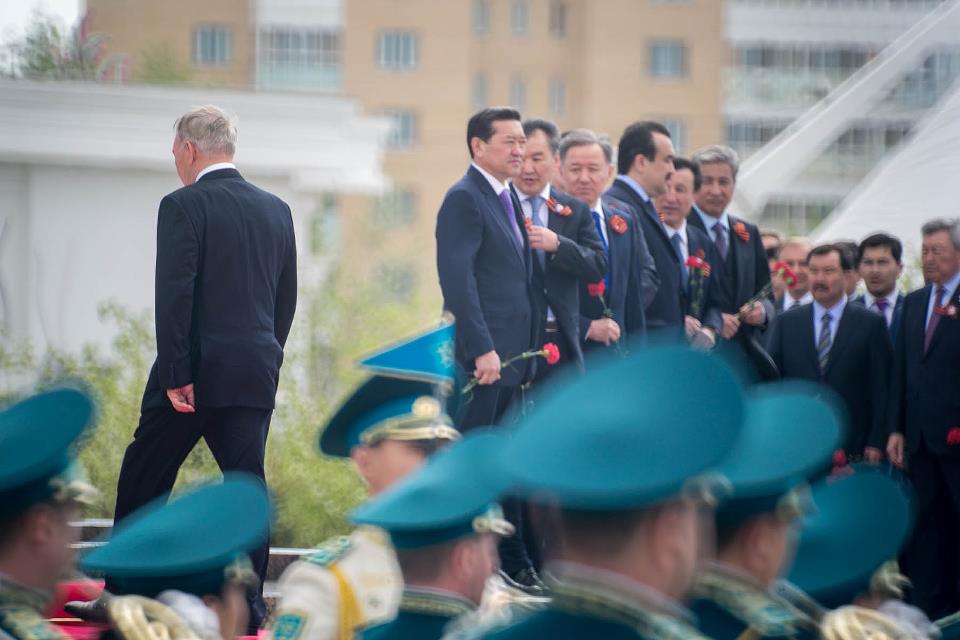 On March 19, 2019, Kazakh President Nursultan Nazarbayev announced he would be stepping down after nearly three decades in power.
On March 19, 2019, Kazakh President Nursultan Nazarbayev announced he would be stepping down after nearly three decades in power.
Bottom Line Up Front:
-
On 19 March in a surprise move, Kazakhstan’s President Nursultan Nazarbayev resigned during a public television announcement.
-
Nazarbayev’s resignation is strategic and designed to ensure a stable future for his country by promoting a smooth political transition.
-
Russia and China each have a vested interest in Kazakhstan, but Nazarbayev has successfully balanced these interests in Astana’s favor.
-
Nazarbayev will remain a key decision-maker, while grooming the next generation of leaders, focusing on how to navigate Sino-Russian competition in the region.
On March 19, 2019, Kazakh President Nursultan Nazarbayev announced he would be stepping down after nearly three decades in power.Nazarbayev’s resignation was announced during a public television address and widely received with surprise. The Kazakh strongman has been lauded for leading the country through several economic crises and maintaining ethnic and social stability, but criticized for consolidating power and repressing political opposition. Nazarbayev declared Kassym-Jomart Tokayev, the speaker of the upper house of parliament and one of his most trusted allies, as acting president until the presidential election scheduled for 2020. In reality, Nazarbayev is merely stepping down from the official post of president, while retaining much of his political power. He remains as the leader of the ruling party, Nur Otan, and as the lifelong chairman of Kazakhstan’s Security Council—positions ensuring his ability to weigh in on every major domestic and foreign policy issue. In his speech, he acknowledged this fact, stating: ‘I am staying with you. Caring for the country and its people will remain my concerns.’
Nazarbayev’s resignation stands in stark contrast to the recent political transition in Uzbekistan and signals a possible leadership transition model for other former Soviet republics with aging strongmen still in office. When neighboring Uzbekistan’s president Islam Karimov died in 2016, Nazarbayev witnessed what happens when long-term authoritarian leaders die in office: the complete deconstruction of Uzbekistan’s security apparatus and subsequent prosecution of several of Karimov’s family members and accomplices. Other authoritarian leaders in the region are surely watching how the political future of Kazakhstan will unfold and, if proven a stable model, may adopt a similar strategy.
Nazarbayev’s most important legacy may be the finesse with which he has balanced his country’s relations with two major powers on the Eurasian continent—Russia and China. Kazakhstan is close to Russia, not only geographically but also culturally. Approximately one-third of the Kazakh population is ethnically Russian and leaders in Moscow consider Kazakhstan within their sphere of influence—economically, politically, and militarily. For Beijing, Kazakhstan is a pivotal partner in China’s ambitious Belt and Road Initiative (BRI), as it connects China’s West with the rest of the Eurasian continent. President Xi Jinping illustrated the importance of Kazakhstan as a partner when he first announced BRI while on a visit in Astana in 2013. To date, 51 joint Sino-Kazakh trade and investment agreements worth approximately $28 billion have been signed.
Russia and China appear to have reached an informal agreement of cooperation in Central Asia, including in Kazakhstan. Russia’s economic power has been attenuated by sanctions and foreign conflict engagements in Ukraine and Syria, allowing China to step up as an economic partner for Kazakhstan. Moscow eyes Beijing’s growing influence in Central Asia with caution, but has genuinely tolerated the marriage of convenience, at least for now. Chinese investment in Central Asia serves Russia’s goals in the short-term, as Moscow would rather have to deal with Beijing than Washington. Nazarbayev has successfully leveraged the growing Sino-Russian entente. Although Kazakhstan remains close with Russia in the security sphere, Chinese economic interests and energy dependence in Kazakhstan ensures Astana a certain level of independence from Moscow. The appointment of Tokayev as Nazarbayev’s replacement illustrates this point further: a well-experienced diplomat, who speaks fluent Chinese and has strong ties with both Moscow and Beijing.
Many analysts believe Nazarbayev’s resignation presents opportunities for Moscow and Beijing to intervene more aggressively in Kazakhstan. But this analysis fails to account for Nazarbayev’s grand design. After all, he will remain as the head of the country’s decision-making apparatus, at least informally. Kazakhstan’s geography could have made it a victim of geopolitical rivalry between Moscow and Beijing, but until now Nazarbayev has performed a delicate dance, ensuring the country’s independence while reaping the benefits of Chinese and Russian interests. Moreover, Nazarbayev has now guaranteed Kazakhstan’s stable political transition while ensuring that he will remain at the center of political decision-making in Kazakhstan—a major focus of which will be balancing future great-power competition between Russia and China.




